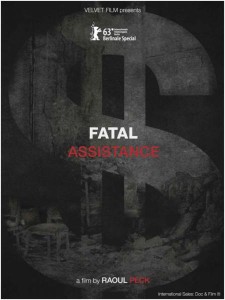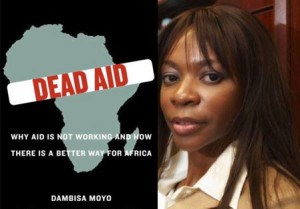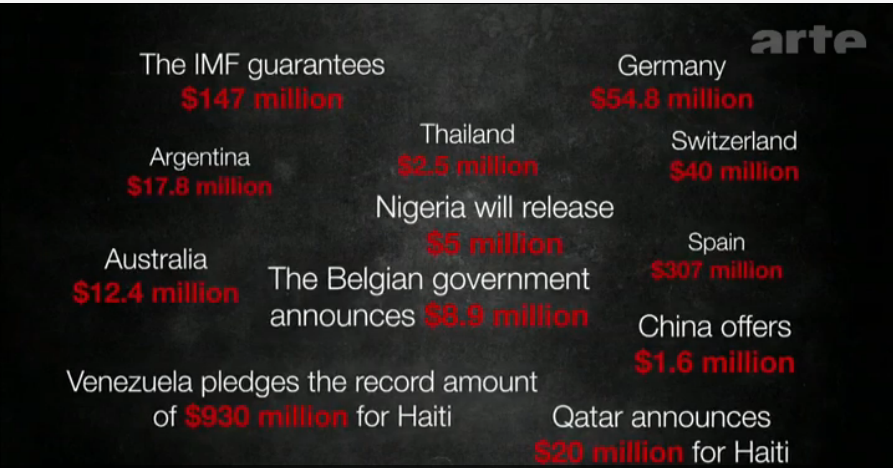Haiti is fated to loom amidst the islands of the Caribbean as Africa does amidst the continents of the world – as a dark, destitute, diseased, desperate, disenfranchised, dishonest, disorganized, disassociated, dangerous and, ultimately, dysfunctional mess…
And, even though white foreign faces appear as evil forces from time to time, black indigenous faces (like those of the Tonton Macoutes, FRAPH, and even Catholic Lavalas devotees) are the constant, central, and catalytic characters in Haiti’s purgatory.
(“Haiti’s Living Nightmare Continues,” The iPINIONS Journal, March 7, 2005)
I wrote this dire lament five years before the catastrophic earthquake of 2010. It explains why that earthquake struck me as Mother Nature’s way of either burying Haiti – to finally put it out of its miseries, or razing old Haiti – to provide a clean slate on which to build a new one.
 Nobody was more hopeful than I that it would be the latter. I was duly encouraged when former U.S. presidents Bill Clinton and George W. Bush seemed as committed to building a new Haiti as they ever were to winning a new election.
Nobody was more hopeful than I that it would be the latter. I was duly encouraged when former U.S. presidents Bill Clinton and George W. Bush seemed as committed to building a new Haiti as they ever were to winning a new election.
I am hopeful that what will distinguish this latest round of foreign aid is the vested interest all donor nations are taking in Haiti’s sustainable development. Indeed, nothing militates against billions more being squandered quite like having former U.S. President Bill Clinton, instead of local leaders, managing this nation-building project. Especially considering that one could be forgiven for thinking all Haitian politicians are congenitally incompetent and corrupt.
(“Haitians: Returning to Africa…,” The iPINIONS Journal, February 12, 2010)
Yet my awareness was such that my hopes remained tempered.
I just hope this outpouring of support is coordinated and sustained enough to help the Haitian people build a twenty-first century infrastructure, as well as the political and civic institutions to manage it. For, as pledges in the wake of the Indonesian Tsunami proved, those who rush for the limelight to make grand pledges of financial aid often hide in the shadows when it comes to honoring them.
(“Haiti’s Catastrophic Earthquake,” The iPINIONS Journal, January 14, 2010)
Sure enough, a mere six months after the earthquake, no less a person than Clinton himself was complaining about the failure of donor nations to honor their pledges.
In fact, they have reportedly given only ten percent of the financial aid they promised. Even the United States – with Barack Obama as president – has only paid $30 million of the $1.5 billion it promised. Yet, as soon as the next tragedy hits, these same compassionate poseurs will be rushing for the limelight to pledge billions more that they know, or should know, they will never honor.
(“Haiti’s Compassionate Poseurs,” The iPINIONS Journal, July 14, 2010)
I hasten to stress that Clinton could’ve complained with equal despair and frustration about Haitian leaders failing to establish institutions to manage those billions if donor nations had honored their pledges. To be fair, the United Nations and crusading NGOs made it all too easy for Haitians to rely on them for institutional support and public services. The result, alas, has been a dystopian manifestation of the proverb about giving people fish instead of teaching them to fish.
 In any event, compared to my commentaries, Raoul Peck’s documentary film, Fatal Assistance, speaks volumes about the Sisyphean impact of humanitarian aid on Haiti’s development.
In any event, compared to my commentaries, Raoul Peck’s documentary film, Fatal Assistance, speaks volumes about the Sisyphean impact of humanitarian aid on Haiti’s development.
Only a fraction of the $9 billion pledged by foundations around the world ever reached the impoverished island, and that 350,000 Haitians still live in camps.
‘Fatal Assistance’ leads us to one clear conclusion … current aid policies and practice in Haiti need to stop immediately.’
(New York Post, January 30, 2015)
In fact, it documents the devastating failure of efforts to build a new Haiti. Never mind that anyone who knows anything about Haiti could easily visualize scenes that imbue this film with its conflicting, discouraging pathos.
What’s more, Peck’s documentary only reinforces what progressive Africans have been saying for years, namely that aid does little more than provide fodder for kleptomaniacs, perpetuate economic dependency, and feed civil strife.
 Here, for example, is what internationally acclaimed economist Dambisa Moyo of Zambia wrote in a March 21, 2009, op-ed for the Wall Street Journal dated:
Here, for example, is what internationally acclaimed economist Dambisa Moyo of Zambia wrote in a March 21, 2009, op-ed for the Wall Street Journal dated:
Evidence overwhelmingly demonstrates that aid to Africa has made the poor poorer, and the growth slower…
Aid is an unmitigated political, economic and humanitarian disaster.
Hence the oxymoron “fatal assistance.” And it is self-evident – not just in perennially underdeveloped Haiti, but in “developing” countries like Kenya too.
In framing his dramatic shift in U.S. policy towards Cuba, President Obama pleaded that, if you’ve tried the same thing for fifty years and have little to show for it, you should try something new. By the same token, given that rich countries have been giving aid to poor countries for even more than 50 years and have even less to show for it, they should try something new too.
The failure of trillions in U.S. aid to build an Iraq that can govern, defend, and sustain itself is instructive. The lesson is that, when it comes to nation building, no amount of aid can substitute for local people struggling, with whatever resources they have, to build their nation themselves.
Indeed, 30,000 American-trained Iraqi soldiers shocked the world last summer when they hightailed it from a ragtag band of 300 Daesh terrorists in Mosul. But the unshocking reason they retreated in fright is that, despite all of their training and military hardware, those Iraqi soldiers had spent a decade standing by as American soldiers fought their battles for them.
I am acutely aware, however, that a shift in policy in this case would portend geostrategic consequences for rich countries that rival socioeconomic consequences for poor countries. Not to mention that China has already established a new paradigm: dealing with poor countries not as places to impose political ideology and transforming institutions, but as places to do mercantile-style business pursuant to its enviable brand of state capitalism.
All the same, [the way China threatens reprisals for just meeting with its political foes] should serve as a warning to all countries around the world that are not just lapping up China’s largesse, but heralding it as a more worthy superpower than the United States. After all, China is spitting imperious and vindictive fire at the rich and mighty United States over a relatively insignificant matter like meeting with the Dalai Lama. Therefore, just imagine what it would do to a poor and weak country in a conflict over a truly significant matter.
(“Countries Queuing Up to Become as Indebted to China as the US Is,” The iPINIONS Journal, September 15, 2011)
Mind you, I’ve written many foreboding commentaries on living in a China-dominated world. Not least because hat would be a world in which democratic freedoms and civil liberties are exterminated as if they were locusts threatening to eat away the fruits of economic development. This, however, is not the commentary for any more about China’s concept of foreign aid. But rich countries in the West would do well to learn from the way China deals with poor countries more as partners than geostrategic pawns or charity cases.
Meanwhile, aid workers are still swarming about, trying to do for Haitians what Haitians should be doing for themselves.
However, so many countries are vying for existential aid these days, not least Syria, Nigeria, and DR Congo, Haiti is hardly the humanitarian cause celebre it was five years ago. Incidentally, this speaks well of celebrity do-gooders like actor Sean Penn who have continued their good and thankless works in relative obscurity
Still, nothing demonstrates compassion fatigue for Haiti quite like Peck having to screen his documentary film at some obscure event in Harlem, instead of being invited to do so at the renowned Sundance Film Festival in Park City (Utah). It also speaks volumes that, even though he originally screened Fatal Assistance at a 2013 Human Rights Watch Film Festival in New York, Peck is still trying to generate public interest in his film. I missed it back then, but I’m recommending it now. It’s available on DVD.
I’d be remiss, though, if I did not mention the discouraging irony inherent in Peck using a member of Clinton’s Interim Haiti Recovery Commission, which operates in Haiti more like a parallel government than an aid organization, to narrate his documentary. After all, this is rather like Spike Lee using a White policeman to narrate his documentary on police brutality against Black men.
Related commentaries:
Haiti’s living nightmare…
Haitians: returning to Africa
Compassionate poseurs…
Countries queuing up for China…

